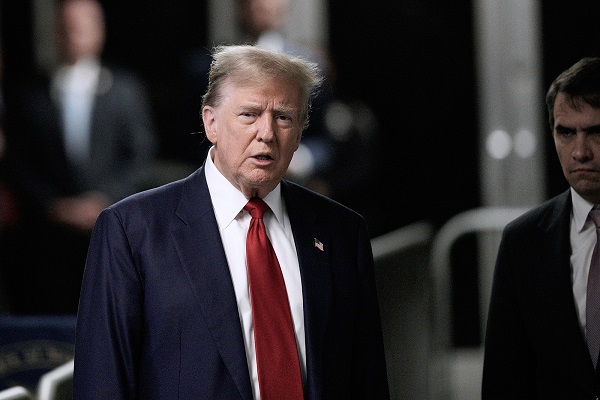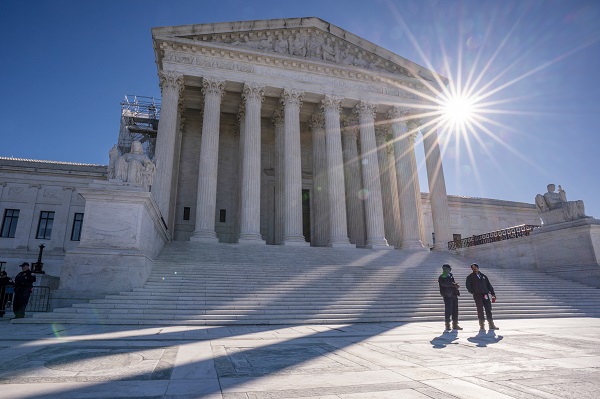By David G. Savage
Los Angeles Times bulletin news The Supreme Court
(Los Angeles Times) — The Supreme Court ruled Monday that former President Donald Trump cannot be prosecuted for his official acts while in office, but left the door open slightly to holding him accountable for some of his alleged efforts to overturn the 2020 election results.
In a 6-3 vote, the justices upheld Trump’s claim that he was largely immune from any criminal charges related to his official actions while in the White House.
The three liberal justices dissented.
The majority sent the case back to lower courts to determine whether any of Trump’s actions involving the 2020 presidential election and effort to overturn President Joe Biden’s victory were unofficial and therefore subject to prosecution.
The decision is a clear win for Trump. The court’s conservative majority agreed with his claims that an ex-president has a broad immunity from criminal charges. And the case was sent back to a district judge for further hearings that will take many months.
bulletin news The Supreme Court
“The president enjoys no immunity for his unofficial acts, and not everything the president does is official. The president is not above the law,” said Chief Justice John G. Roberts Jr. “But Congress may not criminalize the president’s conduct in carrying out the responsibilities of the executive branch under the Constitution. And the system of separated powers designed by the framers has always demanded an energetic, independent executive. The president therefore may not be prosecuted for exercising his core constitutional powers, and he is entitled, at a minimum, to a presumptive immunity from prosecution for all his official acts.”
This outcome all but assures Trump will not face a trial on these charges before the November election. And if he returns to office, he can order the Justice Department to dismiss the case.
The ruling would also extend a shield of immunity to Biden. Trump has declared that he would seek retribution if he returns to the White House, including by bringing criminal charges against those who have gone after him. But the court’s opinion makes clear that an ex-president could not prosecuted because of the actions of that administration’s Justice Department.
In dissent, Justice Sonia Sotomayor said: “Today’s decision to grant former presidents criminal immunity reshapes the institution of the presidency. It makes a mockery of the principle, foundational to our Constitution and system of government, that no man is above the law. … The court gives former President Trump all the immunity he asked for and more. Because our Constitution does not shield a former president from answering for criminal and treasonous acts, I dissent.” Justices Elena Kagan and Ketanji Brown Jackson agreed.
Trump reacted on his social media network, posting in all capital letters: “BIG WIN FOR OUR CONSTITUTION AND DEMOCRACY. PROUD TO BE AN AMERICAN!”
bulletin news The Supreme Court
Roberts was not entirely clear on what parts of the indictment against Trump may survive.

He said that even Trump’s lawyers appeared to agree that a scheme to “submit fraudulent slates of presidential electors” was private and not part of the president’s official duties. But he also said much would depend on the specifics of what Trump said or did.
“It is ultimately the government’s burden to rebut the presumption of immunity,” he wrote. “We accordingly remand to the district court to determine in the first instance — with the benefit of briefing we lack — whether Trump’s conduct in this area qualifies as official or unofficial.”
Some legal scholars sharply criticized the ruling.
The Supreme Court’s “immunity decision will in time rank as among the court’s worst decisions in its many year history,” said Claire Finkelstein, a University of Pennsylvania law professor. “Any U.S. president can now violate the law to remain in power as long as he cloaks it in the trappings of his office.”
The court’s partisan divide in the immunity ruling reminded some of the Bush v. Gore decision that ended the vote recount in favor of President George W. Bush.
University of Chicago professor Alison L. LaCroix said the “court has created a new category of presumptive immunity that invites all future presidents to act first and worry about constitutional consequences later, if ever. Today’s decision is potentially even more sweeping than Bush vs. Gore because it applies to all future presidents, not only to one-off situations like the Florida recount in 2000. It also runs counter to the founders’ design. The founders’ greatest fear was a popular demagogue.”
bulletin news The Supreme Court
Before Monday, the Supreme Court had not ruled on whether a president or ex-president can be prosecuted for a crime.
The closest case came in July 1974, when a unanimous court rejected President Richard Nixon’s claim of executive privilege and ordered him to turn over his White House tapes to investigators pursuing the Watergate scandal.
(Please click onto the image of the cat to hear Oldies & Classic Rock)

The Justice Department had maintained it would not bring charges against a president while in office. Government lawyers said the Constitution’s only remedy for law breaking by a president is impeachment.
But it had been long assumed that a former president could be indicted for crimes, including for actions that he took while in the White House.
Trump’s lawyers, however, argued that a former president was broadly shielded from prosecution for his “official acts.”
They also raised the specter of a partisan prosecution, since the former chief executive and this year’s Republican nominee for president is facing charges lodged by a Democratic administration whose president is running against Trump.
Attorney General Merrick Garland appointed Jack Smith as a special counsel to investigate Trump’s role in the Jan. 6, 2021, attack on the Capitol. And last year, he indicted the former president on charges of conspiring to prevent the counting of electoral votes that confirmed Biden had won the election.
bulletin news presidential immunity
Trump called his supporters to come to Washington on Jan. 6 when Congress was meeting to certify Biden’s victory. He urged them to “stop the steal,” and thousands of them rioted at the Capitol and broke into the building.
The special counsel hoped to bring the charges before a jury this spring, but Trump and his lawyers won several delays from the Supreme Court.
While Trump’s claim of absolute immunity was derided by legal experts, Smith and his lawyers took a similarly broad and unyielding position in the opposite direction. They said a former president had no immunity from criminal charges if a prosecutor won an indictment from a grand jury.
The special counsel’s position was accepted by U.S. District Judge Tanya Chutkan, the assigned trial judge, and upheld by a three-judge panel of the U.S. Court of Appeals in Washington.
However, it soon became clear that Smith’s position was not favored at the Supreme Court.
The justices refused in December and again in February to stand aside and allow Smith to bring his case before a jury.
Roberts and Justice Brett M. Kavanaugh had worked as White House lawyers. And like Justices Clarence Thomas, Samuel A. Alito Jr. and Neil M. Gorsuch, they came up in the post-Watergate era of contentious and highly partisan investigations of presidents and their top advisers.
They were wary of giving prosecutors from the current administration full freedom to bring criminal charges against the previous president.
©2024 Los Angeles Times. Visit at latimes.com. Distributed by Tribune Content Agency, LLC.
bulletin news presidential immunity


